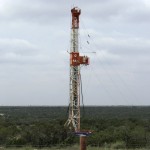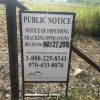Background
By Alex Dropkin and Terrence Henry
Come elections in November, the city of Denton could be split between two very different futures.
The Denton Drilling Awareness Group (DAG) got enough signatures on a petition this year to place an ordinance banning fracking within city limits on local ballots this fall. Though other communities in Texas have passed restrictions on fracking, a moratorium on drilling activity within Denton is uncharted territory, and could spur the rise of similar legislation across the state.
The DAG petition against hydraulic fracking, the drilling method of using water, sand and chemical injections to extract oil and gas from shale formations, cites that fracking operations “impact the City’s environment, infrastructure and related public health, welfare and safety matters.” Aside from concerns over groundwater contamination, noise pollution and air quality, drilling disposal wells that store waste from fracking have also been heavily linked with low-magnitude earthquakes.
The proposed ordinance states, “It shall be unlawful for any person to engage in hydraulic fracturing within the corporate limits of the City.”
But, according to the group, an all-out ban was a last solution in a long, unsuccessful effort to restrict hydraulic fracking through less extreme means. There are over a dozen wells within city limits, and a previous ordinance failed to prevent drilling activity near neighborhoods and residential areas.
“We saw, once the [original] ordinance was passed, the sort of futility of this compatibility strategy,” Adam Briggle, the vice president of DAG said. “The realization was that you can either have fracking or you can have a healthy city, but you can’t have both.”
Mark Burroughs, the mayor of Denton, supports restrictions on fracking but thinks that the moratorium goes too far, and worse, might be illegal.
“If it does pass, the city has to follow it,” Burroughs says. “We could be bound to enforce an illegal act, which throws into a whole panoply of open issues…. We as a city would be bound to defend it, whether we believed it was illegal or not. So it’s a real open, difficult series of issues.”
Enough signatures were collected on the petition that the Denton City Council had to vote on it this summer. On July 15, the petition made its way to the council for a vote. At a hearing that went well into the next morning, eight hours of testimony for and against the ban was heard by the council. Ultimately the council rejected the ban with a 5-2 vote. Now the ban will go before voters in November.
Almost without a doubt, if the proposed ban passes in November, it will draw legal challenges. Around the country, oil and gas companies have filed suits against fracking bans, and the state of Texas itself could get involved if it believes Denton oversteps its authority.
Though no fracking restrictions have been challenged in Texas so far, Briggle is encouraged by rulings on local regulations against the oil and gas industry.
“You can see that municipalities have a winning track record when it comes to case law history against the oil and gas industries in Texas, and I think we’ve written a smart ordinance here,” he says, “But you’ll never know until it goes through a court system.”
Denton is checking the signatures on the petition to ensure they belong to Denton residents—a standard procedure. Until elections, Briggle says the DAG’s plan is to get the word out as much as possible.








